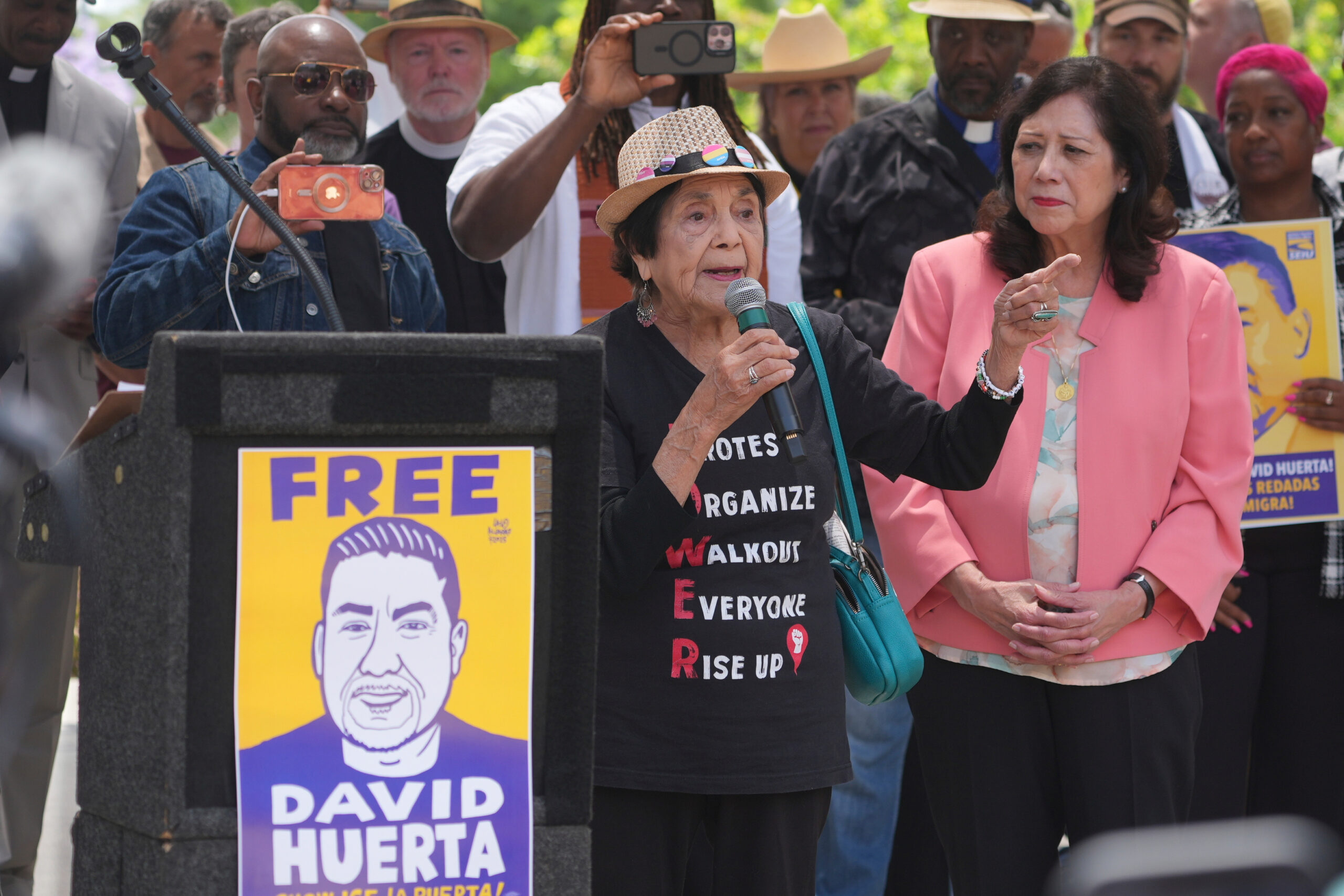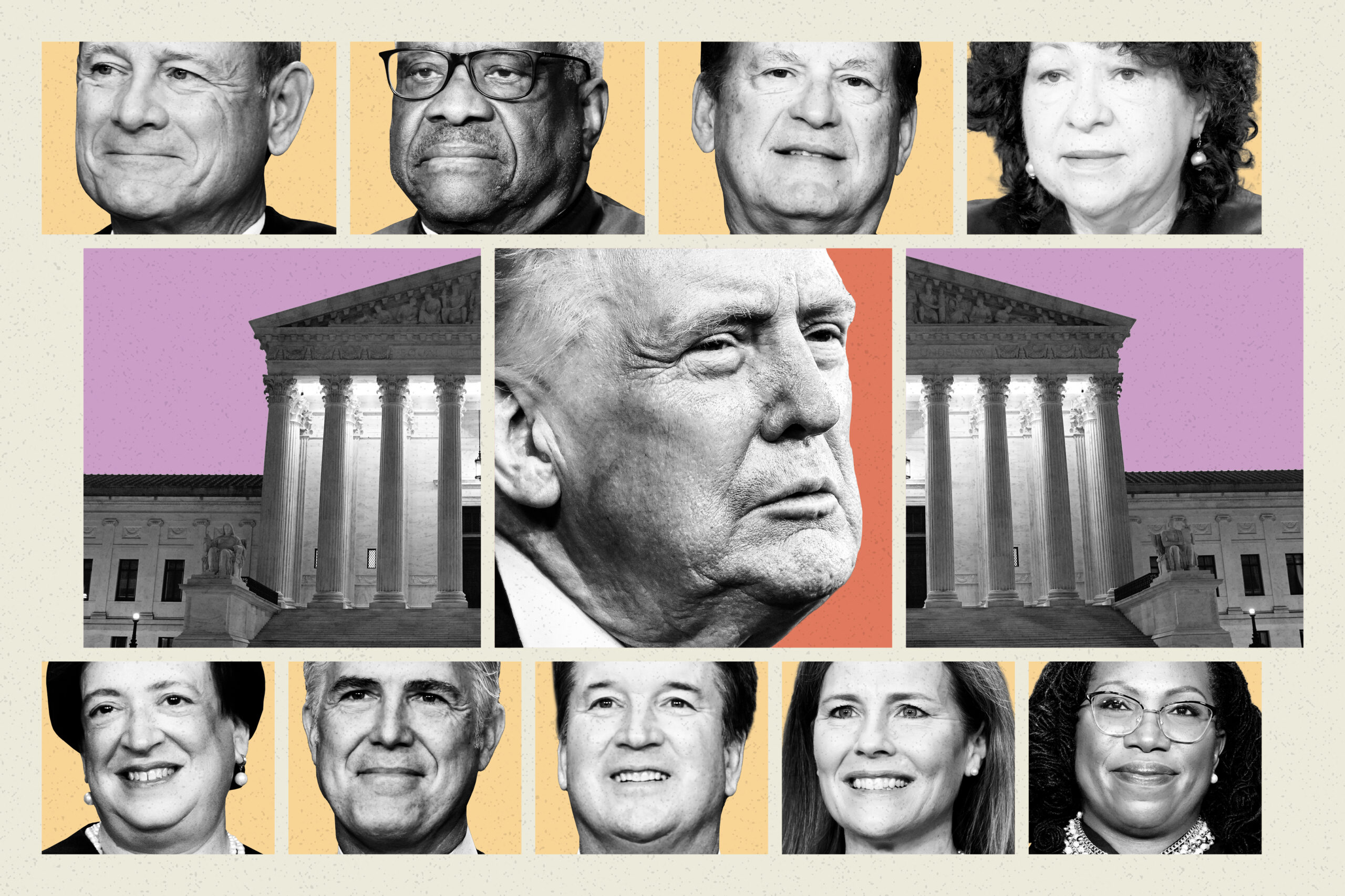The agriculture sector is on edge like never before.
With ICE officers chasing undocumented immigrants through fields and barging into meatpacking plants, workers are spooked. Even before the farm raids, workforce shortages and economic uncertainty rankled the industry. Now, as harvest season arrives for many crops, concerns are growing that there may not be enough workers out there to feed the country.
To Dolores Huerta, it’s an unprecedented problem caused squarely by the Trump administration. “It’s an atrocity, what they’ve been doing to the immigrant community,” Huerta said in an interview with POLITICO Magazine. The longtime labor activist says the federal government’s current approach is “very, very different” than anything she’s seen before.
And the 95-year-old Huerta has seen a lot.
She first began lobbying the California legislature on farm labor issues when she was just 25, and she founded an agriculture workers union soon after. In her early 30s, she partnered with civil rights leader Cesar Chavez to create the National Farm Workers Association, now the United Farm Workers. For years, she and Chavez worked in tandem, delivering major victories to protect farm workers from exploitation and exposure to dangerous pesticides. President Barack Obama awarded her the Presidential Medal of Freedom in 2012.
The Trump administration is now struggling to reconcile its mass deportation efforts with the need to keep farm production going. Huerta is not optimistic about how it will all play out, though she was able to poke at Agriculture Secretary Brooke Rollins’ recent suggestion that automation will soon replace human laborers. “I guess I could just wait until they get enough robots to do the farm work,” Huerta joked.
This conversation has been edited for length and clarity.
The Trump administration has launched farm raids targeting undocumented immigrants, which has sent a chill through the labor force and industry. You’ve advocated for farm workers for decades. Does the current climate feel familiar, or are we in a really different place?
Oh, it’s a very, very different place. Because in the past, in the ’50s, when we had this “Operation Wetback,” they were not putting people in jail. They would repatriate people. They would deport them, take them to the border. Somewhere along the way, I think during Newt Gingrich’s time, they started putting people in jail, but then they would let them go. It was not putting people in prisons, like we’re seeing right now. The kind of brutality, the horror, the kidnapping, endangering people’s lives, separating the families — the way that Trump did in the last administration, and they’re doing now, leaving all of these missing children — it’s an atrocity, what they’ve been doing to the immigrant community.
Many of those people that they have been picking up and arresting are farm workers. Here in Bakersfield, California, we were the first city to be hit. When Border Patrol came in, they arrested [78] people, and only one person had any kind of criminal record. And when they talk about a criminal record, it could be a traffic stop. It could be just that they came in, and they were deported, and came back in again. These are not violent crimes that we’re talking about. They are, you might say, civil infractions, and yet they’re being treated like they were criminals.
This administration says it wants to get to a “100 percent American workforce.” It also has discussed rapidly expanding migrant visa programs, like H-2A. Do you see those two goals in conflict? How might that play out?
Well, I think it would be really great to have American workers to work on farms. Farm work has been denigrated for so many years by the growers themselves, and they did this because they never wanted to pay farm workers the kind of wages that they deserve. Farm workers were essential workers during the pandemic. They were out there in the fields. So many of them died because they never got the proper protections that they needed. But they were out there every single day, picking the food that we needed to eat.
Farm workers don’t get the same kind of benefits or salaries that others get. We just recently did a study with the University of California Merced. Their average wage is $30,000 a year, $35,000 a year. And on that, they have to feed their families. A lot of them, unless they have a union contract, they’re paid minimum wage. They’re not respected.
The whole visa program, the H-2A program, it’s always been there. Cesar Chavez and I, when we started the United Farm Workers, one of the first things that we did was end the “Bracero Program,” which was a similar [guest worker] program. Now they’ve increased these H-2A workers in agriculture. This is a step above slavery. They can’t unionize. They don’t get Social Security. They don’t get unemployment insurance. Farmers save money by having these H-2A workers. They cannot become citizens. There is no way for them to even get a green card.
If you were trying to get to a 100 percent American workforce, what’s the solution here? Does it start with paying more competitive wages for workers? Or is it something else?
Well, right now, we’re trying to stop a detention center here in California City, which is up here in the Mojave Desert. They are offering the people to work in that center $50 an hour. In California, our minimum wage is $16. That’s what a lot of workers get.
Let’s offer farmworkers $50 an hour, the same kind of a salary that you offer the prison guards, and you’ll get a lot of American workers.
We have very high unemployment in the Central Valley. We have the prison industrial complex, where a lot of our young people are going to prison. So many of these young people don’t have to go to prison if they were paid adequately. I’m sure a lot of them would go and do the farm work, especially if they had good wages to do it. And we still have a lot of young people here in the valley that go out during the summers and they do farm work to help their families. I’m sure a lot of people that we now see that are homeless on the streets and that are able to work would go to work if they were paid $50 an hour.
So it’s just a matter of improving wages?
And training, too. Because farm work is hard work. I mean, you’ve got to be in good physical shape to be able to do farm work.
Why are undocumented workers such a large part of the agricultural workforce? Is it just that these are low-paying, hard jobs that Americans don’t want to do, or is there more going on?
Well, like I said earlier, the growers have denigrated the work so much that people don’t realize that this work is dignified. Farm workers are proud of the work that they do. They don’t feel that somehow they’re a lower class of people because they do farm work. They have pride in their work. If you were to go out there with farm workers, you would be surprised to see that they have dignity, and they care about the work. They care about the plants.
When we started the farm workers union way back in the late ’50s and early ’60s, you would be surprised how many American citizens were out there. Veterans were out there. The Grapes of Wrath was filmed here. All of those workers in that camp were white. It was the “Okies” and “Arkies,” the people that came from Oklahoma and Arkansas and those places to work in the fields. They were all white workers. There were some Latino workers, and then over the years, you had the Chinese, you had the Japanese, and different waves of immigrants that came in to do farm work.
When did it change?
Well, the growers always fought unionization, as they still do to this day. I’ll give an example. There’s a company called the Wonder Company. When you watch television, you see all of their ads for pistachios. They’re billionaires. The United Farm Workers just won a recognition election, and they refused to recognize the union.
When you have a union out there, you have a steward out there in every single crew, and their job is to make sure that there’s a bathroom out there in the fields, which farm workers never had before. We had a big movement to get farmers just having toilets in the field and hand washing facilities, cold drinking water, risk periods, unemployment insurance, et cetera. This is the thing that we fought for, and the growers fought against it, right to the end. The Farm Bureau Federation fought against all of these improvements for farm workers, and they continue to fight.
You supported the 1986 Reagan amnesty, when 1 million farm workers received legal status. The Trump administration has been adamant, for political purposes, that there will be “no amnesty.” Do you think the administration could get to some sort of mass legalization for farm workers? If not, what happens next?
The problem with this administration is, they’re so racist. Racism rules, fascism rules with this administration. I don’t know, I guess I could just wait until they get enough robots to do the farm work.
What about pesticides? You’ve long fought against pesticide use in agriculture because of the effect of exposure on farm workers. Now, there’s this “Make America Healthy Again” push to get rid of pesticides. What do you make of that?
Well, I think maybe that’s one good thing that Robert Kennedy Jr. might do. His father was a champion for the farm workers. The pesticides — we should have gotten rid of those a long time ago. We didn’t have pesticides until after World War II.
There’s a pesticide called paraquat. Paraquat is banned in Europe. It’s banned in almost every country except the United States of America, and it is used right here in Kern County in California. It causes cancer. It causes leukemia. It causes Parkinson’s disease, and we cannot get it banned in California. We know that when plants are planted, when food is planted, the pesticide is already in the seeds. We were trying to stop that in Washington, D.C., and were unable to. We were even just trying to get them to put information on it, so when you go in to buy your fruit, it would have a sticker on it that said, “This particular fruit or vegetable has been treated with this pesticide.” It’s in the fruit when you eat it.
Just recently, we had about four or five young people in their late 40s, early 50s, all have died of cancer, and they’re from Delano, California.
Are these farm workers?
No, but when they spray this stuff, it also goes into the towns. So nobody’s really safe from it.
Is this pesticide issue something you could collaborate or find some common ground with the Trump administration?
Yeah, we would love to. But you know what? It’s not going to happen, because pesticides really come from the petroleum industry.
Have you discussed this with Robert F. Kennedy Jr., or would you be open to meeting with him? I know his father was a friend of yours and a great champion of your cause.
I imagine, maybe, when we talk about this issue. I wouldn’t agree with Robert Jr. on the issue of vaccinations, or fluoride in our drinking water, et cetera, and some of the issues that he espouses.
I know him. I’ve known him for many, many years. I haven’t spoken to him. He did try to contact me when he was running, and I didn’t respond. I knew that the family, that Kerry and Ethel and the rest of them, were not happy about his supporting Trump.
But you haven’t spoken to him since he became HHS secretary?
No. I know people that have spoken to him.
The labor movement as a whole has an unusual relationship to Donald Trump, who claims to champion the working class. Do you think union leaders have more to gain by working with Trump, or by opposing him? What explains his appeal to many union members?
Well, I can’t speak for the Teamsters. I think there was a kind of a betrayal of the working people, because I know the majority of the labor unions went against Trump and endorsed Biden [in 2024]. I think that was very damaging.
I think a good comparison is if you look at what they’ve done in Mexico with Claudia Sheinbaum and the president before her. They’ve done incredible work in Mexico right now because it has been very labor-focused, very working people-focused, in contrast with what’s happening here in the United States, where we are very billionaire- and millionaire-focused. And so you can see in Mexico they’ve been able to increase pensions, increase the minimum wage, increase benefits for the working people.
Last question: You’re 95, what’s your secret? What do you eat?
I’m a vegetarian, and I just stay busy. I think you just have to stay busy.




